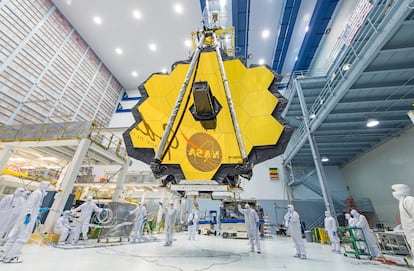NASA Rebellion: Hundreds of Workers Sign Letter of Protest Against Trump's Cuts


“We disagree.” This is the phrase repeated over and over again by nearly 300 current and former NASA employees in an open letter addressed to Sean Duffy, the US Secretary of Transportation, whom Donald Trump recently appointed as acting head of the space agency after rejecting a confidant of Elon Musk. The signatories of the manifesto warned Duffy on Monday against the harsh cuts to the agency's science budget— which the White House intends to cut in half —because it poses a threat that “compromises human safety, wastes public resources, weakens national security, and undermines NASA's core mission.”
In addition to warning of the "terrible consequences for the agency and the country" of the cuts the US president intends to make, he calls them "arbitrary" and criticizes the attempt to implement them "against the mandate of Congress," which decides NASA's budget. At a time when criticism of Trump has devastating consequences, NASA employees point to a regulation that allows them to formally disagree with their boss when they believe a decision contravenes the agency's interests. They also try to protect themselves by emphasizing that NASA's statute encourages such a diversity of opinions, without fear of dismissal or retaliation.
In the hours following its publication, more than 20 Nobel laureates, including Ardem Patapoutian, signed the manifesto, calledthe Voyager Declaration in honor of the Voyager 1 and 2 space probes, launched in 1977 to study the large planets outside the solar system and still communicating with Earth after having ventured into interstellar space . They are the two greatest icons of scientific space exploration. And such missions will no longer be possible if NASA implements the cuts proposed by the White House, the signatories lament.
The letter alleges that employees are being pressured to take harmful measures against the agency itself, such as canceling such robotic scientific exploration missions or injecting budget cuts into NASA's Technical Authority system, designed to ensure astronaut safety on crewed space missions and to learn from accidents like the Columbia disaster . "We disagree," the signatories of the Voyager Declaration add, referring to each of these measures, which include the cancellation of participation in international cooperative space missions, widespread employee layoffs, and indiscriminate cuts in the areas of scientific and aeronautical research.
The manifesto also denounces the "culture of silence" that the space agency's management has implemented over the past six months, since Donald Trump returned to power. Hours after the publication of this open letter, the resignation of Makenzie Lystrup , director of the Goddard Space Flight Center, was also interpreted as a sign of rebellion. Goddard is NASA's largest scientific research center and was the site of the creation of the Hubble and James Webb space telescopes, which have advanced human understanding of the universe thanks to the use of these two instruments by the international scientific community.
Although Lystrup did not directly express any criticism in her resignation letter, she did defend her research center's most recent scientific achievements, both in the fields of Earth observation and solar system exploration. These types of NASA jobs are now in question. It was her responsibility to implement mass layoffs and cancel critical missions for the Goddard Center, one of the centers hardest hit by the cuts Trump is seeking to impose. With her resignation, Lystrup refuses to participate in this rapid U-turn at NASA, which the signatories of the letter openly denounce.
Another iconic NASA science center hit hard by the cuts is the Jet Propulsion Laboratory (JPL). Its director also decided to step down on May 7, shortly after learning of the White House's plans to cut the US space agency's science program in half. Trump was determined at the time to reorient NASA into a human space travel agency, paving the way for magnate Elon Musk to fulfill his dream of colonizing Mars. To this end, he enlisted Jared Isaacman—a private astronaut, Musk's partner, and also a billionaire—to lead the space agency.
Isaacman had already passed Senate confirmation , and his appointment seemed imminent at the end of May. Then came Musk's departure from the US government, initially staged as a friendly farewell. Forty-eight hours later, Trump withdrew Isaacman as his nominee to lead NASA, and within a week, an explosive rift between Trump and Musk erupted.
EL PAÍS





